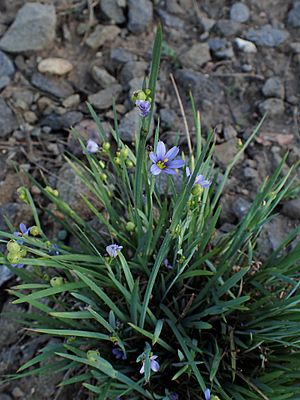Northern blue-eyed grass facts for kids
Quick facts for kids Northern blue-eyed grass |
|
|---|---|
 |
|
| Sisyrinchium septentrionale | |
| Scientific classification |
|
| Kingdom: | Plantae |
| Clade: | Tracheophytes |
| Clade: | Angiosperms |
| Clade: | Monocots |
| Order: | Asparagales |
| Family: | Iridaceae |
| Genus: | Sisyrinchium |
| Species: |
S. septentrionale
|
| Binomial name | |
| Sisyrinchium septentrionale E.P.Bicknell
|
|
| Script error: The function "autoWithCaption" does not exist. | |
| Synonyms | |
|
Bermudiana septentrionalis (E.P. Bicknell) Lunell |
|
Script error: No such module "Check for conflicting parameters".
The northern blue-eyed grass (scientific name: Sisyrinchium septentrionale) is a beautiful plant that grows naturally in western North America. It's known for its pretty blue or violet-blue flowers.
This plant can be found in several parts of Canada, including British Columbia, Alberta, Saskatchewan, and the Northwest Territories. It also grows in the U.S. states of Washington (in Okanagan, Ferry, Stevens, and Pend Oreille counties) and Montana (in Sheridan and Richland counties).
What it Looks Like
The northern blue-eyed grass is a type of perennial herb. This means it's a plant that lives for many years, coming back each spring. It can grow to be quite tall, reaching up to 50 centimeters (about 20 inches) high.
Its most striking feature is its flowers. These flowers are usually a pale blue or a light violet-blue color. They often have a bright yellow center, which makes them stand out even more.
Where it Grows
This plant prefers to grow in specific areas across western North America. It thrives in open, grassy places. You might spot it in meadows or along roadsides where it can get plenty of sunlight. Its wide range shows how adaptable this lovely plant is to different environments.
 | Claudette Colvin |
 | Myrlie Evers-Williams |
 | Alberta Odell Jones |

